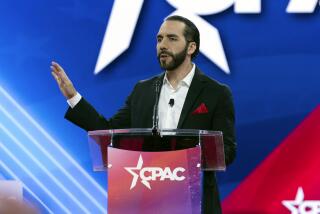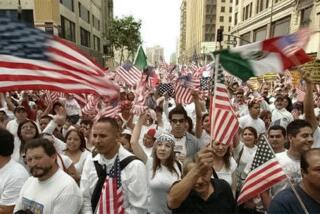Mexican immigrants following homeland’s presidential race
Ramiro Romero owns an auto upholstery business in Lynwood, has sent three children to college and is a first-time voter in a country in which he hasn’t lived for more than 30 years: Mexico.
“As a mexicano, we haven’t lost our roots, our culture, and that makes voting a civic necessity,” Romero, 56, said one morning at his bustling workshop on Atlantic Avenue.
“We want a prosperous Mexico. We want a Mexico that’s not in the top ranks for violence but in the top ranks for its economy, so we won’t have to go looking for opportunities to other countries.”
Romero, who holds dual citizenship, is among the tens of thousands of Mexicans living abroad who are voting by mail in the July 1 presidential election — a contest being closely watched as the country confronts soaring violence related to the U.S.-backed drug war.
The right to vote from abroad was won in 2005. Mexican nationals in 104 countries requested mail-in ballots this year, and 77% of those are from the U.S. — concentrated mostly in California, Texas, Illinois, Florida and New York.
Despite an estimated 12 million Mexican nationals living in the United States alone, only 59,087 have registered worldwide for next month’s election — 45,512 in the U.S., and 1,580 of those in Los Angeles. Through Monday, 20,782 ballots have been received — 17,970 from the U.S. The ballots must be received by June 30.
One reason for the low number: Casting a ballot from abroad requires a government-issued voter ID card, which can be obtained only inside Mexico. That effectively shuts out undocumented immigrants, who cannot freely cross the border.
“It’s like they gave us the car but not the keys to drive it,” said Francisco Moreno, secretary-general of the downtown-based Council of Mexico Federations in North America, an umbrella organization for the L.A. area’s tight-knit migrant clubs — groups that put on cultural events representing the pueblos of their origin. “The law came out incomplete.”
Moreno is among a sophisticated network of core migrant leaders in Southern California who lobbied their home country’s politicians for years for the right to vote from abroad and are now asking for greater freedom to cast ballots. Migrants, though, will have to wait for Mexico’s next Congress to convene before they can push their case for voter ID cards to be issued at their country’s embassies and consulates.
Meanwhile, migrant federation leaders in L.A. walk a delicate line between maintaining an impartial official profile and being advocates for a particular candidate.
For example, Santa Ana tax preparer Guadalupe Gomez, a longtime leader in the local Zacatecas federation, said he is supporting the ruling National Action Party, or PAN, candidate Josefina Vazquez Mota because as a government secretary she regularly visited Southern California to hear migrants’ concerns.
“I represent a nonpartisan group. Here, we analyze the person,” Gomez said. “Josefina came four times a year.”
It’s not clear if migrant voters in the U.S. are leaning in any significant way toward a single candidate. But the last presidential election proved that every vote is critical.
In 2006, PAN candidate and eventual winner Felipe Calderon won 57.40% of votes abroad, followed by the Democratic Revolutionary Party’s Andres Manuel Lopez Obrador with 33.47%; in total, 32,632 votes were validated and counted. That election, though, resulted in a two-month saga of ballot recounts and street protests, ending with Calderon beating Lopez Obrador by a mere 233,831 votes out of 41 million cast, or 0.56 percentage point.
This time around, the formerly ruling Institutional Revolutionary Party (PRI) has enjoyed a resurgence with candidate Enrique Peña Nieto, who is leading in the polls. His supporters recently opened a campaign office at Plaza Mexico in Lynwood.
Gladys Pinto, a native of Yucatan, is a local PRI member who helped open that office.
“I’m very faithful to my party. I’m a Catholic, I’m a Democrat and I’m a priista,” she said, using the common term for a PRI supporter.
Lopez Obrador, meanwhile, is running under the banner of a three-party leftist coalition that came together after his razor-thin loss. Closely tied to Mexico’s active left, liberal migrants in the U.S. are organized into hundreds of unofficial committees supporting him in his second run.
In the L.A. area, Juan Jose Gutierrez, an attorney and immigrant rights advocate, says Lopez Obrador represents the promise of “true change” for the country.
“The country is in danger, serious danger,” Gutierrez said. “We’re sending articles, making calls, sending letters, asking our relatives in Mexico to vote for our candidate.”
The enthusiasm is so high among political activists here that a debate held at Plaza Mexico a few weeks ago ended in shouting matches, according to several migrants who were there.
Romero, the Lynwood business owner, knows what it’s like not to be able to cross the border freely. He came to the U.S. illegally when he was 18. But since becoming a U.S. citizen in 1998, he has been able to return without worry to the western state of Michoacán and his hometown of Cherán, which made headlines last year after residents formed a communal militia against drug gangs.
“When we think about retiring, we want to return to our homes,” he said, passing yellowing posters hung in his workshop showing Cherán’s annual pueblo festival.
Until then, the president of the L.A. area’s Michoacán federation hopes to raise the profile of voters aboard, though he is also realistic.
Migrants “are the second-largest source of income for the country,” Romero said, “and none of the candidates have looked our way.”
More to Read
Start your day right
Sign up for Essential California for news, features and recommendations from the L.A. Times and beyond in your inbox six days a week.
You may occasionally receive promotional content from the Los Angeles Times.






